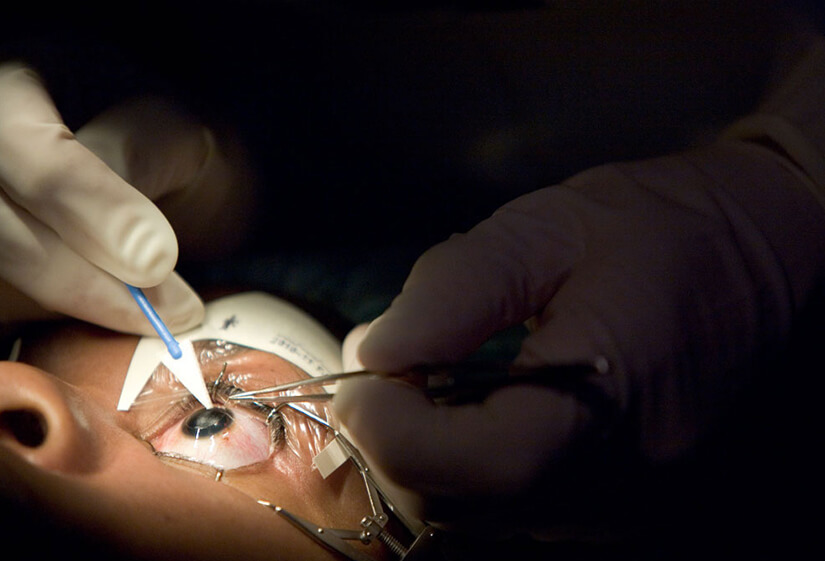When it comes to achieving clear vision without the need for glasses or contact lenses, ICL surgery (Implantable Collamer Lens surgery) is emerging as a highly effective option for many individuals. This procedure offers a permanent solution for those who are not candidates for LASIK or other forms of laser eye surgery. Whether you’re tired of the inconvenience of glasses, frustrated with contact lenses, or simply seeking a better quality of life through improved vision, ICL surgery could be the answer.
In this detailed guide, we’ll walk you through everything you need to know about ICL surgery, from the procedure itself to the recovery process and the benefits it offers.
What is ICL surgery?
ICL surgery involves the insertion of a collamer lens (a biocompatible material) into the eye, between the natural lens and the iris, to correct refractive vision problems such as nearsightedness, farsightedness, and astigmatism. Unlike LASIK, which reshapes the cornea to correct vision, ICL surgery works by implanting a lens that provides additional focusing power to improve the clarity of your vision.
The procedure is minimally invasive, quick, and highly effective for patients who might not be ideal candidates for traditional LASIK surgery. People with thin corneas or high refractive errors often benefit from ICL surgery.

How Does ICL Surgery Work?
The ICL surgery procedure begins with a thorough eye examination, including tests to assess your vision and eye health. Once you are deemed a suitable candidate for the surgery, the following steps are typically followed:
- Preparation and Anesthesia: Before the procedure, you will be given a topical anesthetic, typically in the form of eye drops, to numb the area. In some cases, a sedative may be provided to help you relax.
- Creating a Small Incision: The surgeon makes a tiny incision on the side of the cornea (the clear outer layer of the eye) to insert the lens. This small incision usually doesn’t require stitches.
- Implantation of the Lens: The surgeon carefully inserts the ICL into the eye through the incision and positions it between the natural lens and the iris. The manufacturer designs the lens, made of biocompatible collamer, to work seamlessly with the eye’s natural structures.
- Final Adjustments: The surgeon ensures that the lens is in the correct position and that the vision correction is optimal.
- Post-Procedure Care: The medical team will monitor you for a short time after the surgery to ensure the lens is in place and there are no immediate complications. The surgery itself typically lasts around 15 to 30 minutes per eye.
Benefits of ICL Surgery
ICL surgery offers several distinct advantages over other vision correction methods. Some of the key benefits include:
1. No Need for Daily Maintenance
Unlike glasses and contact lenses, which need regular cleaning, replacement, and care, an ICL requires little to no maintenance once it is in place. It’s a one-time procedure that provides long-term results.
2. Improved Visual Clarity
The ICL provides high-quality vision correction, allowing patients to experience improved contrast sensitivity and sharper vision, even in low-light conditions.
3. Reversible Procedure
ICL surgery allows doctors to remove or replace the lens if necessary, giving patients peace of mind that they can adjust the lens if their vision changes in the future.
4. Suitable for a Wide Range of People
ICL surgery is an excellent option for people who may not be candidates for LASIK, such as those with thin corneas, high refractive errors, or dry eyes. It can also benefit individuals who have had previous eye surgeries and are still seeking better vision.
5. Quick Recovery Time
Compared to other eye surgeries, ICL surgery typically offers a quick recovery. Most patients notice significant improvements in their vision within a few days, and the overall healing time is relatively short.
Is ICL Surgery Right for You?
If you have high levels of nearsightedness, farsightedness, or astigmatism that glasses or contact lenses cannot fully correct, you may consider ICL surgery as a great option. However, not everyone is a suitable candidate for ICL surgery. Some of the factors that may affect your eligibility include:
- Age: ICL surgery is generally recommended for individuals over the age of 21, as the eye is still developing in younger individuals.
- Stable Prescription: Your prescription should be stable for at least a year before undergoing ICL surgery.
- General Eye Health: People with certain eye conditions, such as cataracts or glaucoma, may not be eligible for ICL surgery.
- Overall Health: Ideal candidates should be in good general health with no serious underlying health conditions.
A comprehensive eye exam and consultation with an ophthalmologist will help determine whether ICL surgery is the best option for you.
What to Expect During the ICL Surgery Recovery Process
After your ICL surgery, it’s normal to experience some mild discomfort, such as itching, dryness, or light sensitivity. However, the majority of patients recover quickly and return to normal activities within a few days. Here’s a general overview of what to expect during the recovery process:
1. Immediate Post-Surgery Care
Your surgeon will provide you with detailed instructions for post-operative care. You may be prescribed eye drops to prevent infection and reduce inflammation. It’s essential to follow these instructions carefully to ensure a smooth recovery.
2. Vision Improvement
Most patients notice immediate improvement in their vision, although it can take several days to a few weeks for your vision to fully stabilize. During this period, your doctor will monitor your progress through follow-up appointments.
3. Limitations
In the first few days after the surgery, you should avoid activities that could put pressure on your eyes, such as rubbing your eyes, heavy lifting, or swimming. Your doctor will give you specific guidelines on when it’s safe to resume normal activities.
4. Final Results
The full results of ICL surgery typically become apparent within a few weeks, with the majority of patients experiencing significant improvements in vision. In some cases, a follow-up procedure may be required to make minor adjustments to the lens.
Risks and Considerations of ICL Surgery
As with any surgical procedure, ICL surgery comes with some risks. While the procedure is generally safe and well-tolerated, it’s important to be aware of potential complications, including:
- Infection: As with any surgery, there is a risk of infection, though this is rare when proper aftercare is followed.
- Increased Eye Pressure: In some cases, the pressure inside the eye may increase, which could lead to glaucoma if not addressed promptly.
- Lens Dislocation: Although rare, there is a possibility that the implanted lens may shift out of position.
- Visual Disturbances: Some patients may experience glare, halos, or other visual disturbances, especially at night.
Your surgeon will discuss these potential risks with you before the procedure to help you make an informed decision.
Cost of ICL Surgery
The cost of ICL surgery can vary depending on the location, surgeon’s experience, and the specific technology used. On average, the cost of the procedure ranges from $3,000 to $5,000 per eye. ICL surgery eliminates the ongoing expense of glasses or contact lenses as a one-time cost, even if the price seems high initially.
Insurance Coverage
Most insurance plans do not cover ICL surgery since it is considered an elective procedure. But Vijaya Nethralaya Super Speciality Eye Hospital offers potential insurance coverage for ICL surgery, making it a more affordable option for many patients.
Conclusion
ICL surgery is a groundbreaking option for those seeking a permanent solution to refractive vision problems. Whether you’re looking for clearer vision or want to reduce your reliance on glasses or contact lenses, ICL surgery offers a safe and effective solution for many patients. With a quick recovery, minimal maintenance, and the potential for long-term results, this procedure has become an increasingly popular choice for people seeking to improve their quality of life.
Before deciding if ICL surgery is the right choice for you, make sure to consult with a qualified ophthalmologist to discuss your specific needs and expectations. With the right guidance and care, ICL surgery can provide you with the opportunity to enjoy clear, sharp vision for many years to come.
Author Details:
Dr. Sushruth Appajigowda holds a prominent position as a cornea, cataract, glaucoma, and LASIK surgeon in Bangalore. He serves as the chief cataract and refractive surgeon at Vijaya Nethralaya Eye Hospital, Nagarbhavi, Bangalore. Renowned as one of the finest LASIK surgeons nationwide, he brings with him over 12 years of experience across multiple LASIK platforms, including ZEISS, ALCON, SCHWIND, AMO, and Bausch and Lomb. Having successfully conducted over 5000 LASIK procedures, Dr. Sushruth holds the title of a Certified Refractive Surgeon and a Fellow of the All India Collegium of Ophthalmology. Furthermore, he stands as a distinguished speaker at various national and international forums, using his expertise to guide you in selecting the most suitable procedure based on your health requirements.

https://vijayanethralaya.com/link-in-bio/
FAQs
1. How long does ICL surgery take?
The entire procedure usually takes about 15 to 30 minutes per eye. It is a quick and minimally invasive procedure.
2. Will I experience pain during ICL surgery?
Most patients do not feel pain during the surgery, as local anesthesia is used. You may feel some mild pressure during the procedure, but it is generally well-tolerated.
3. How soon can I return to normal activities after ICL surgery?
You can typically return to most daily activities within 1 to 2 days, though you should avoid strenuous activities for the first week.
4. Can I have ICL surgery if I have dry eyes?
Yes, ICL surgery may be a suitable option for individuals with dry eyes, especially those who are not candidates for LASIK.
5. Is ICL surgery safe?
ICL surgery is generally considered very safe, with a high success rate. However, as with any surgery, there are some risks, which your surgeon will discuss with you beforehand.
6. How much does ICL surgery cost at Vijaya Nethralaya Super Speciality Eye Hospital?
The cost of ICL surgery varies depending on the specific needs of the patient. Vijaya Nethralaya offers competitive pricing and may also assist with insurance claims to help offset costs.













